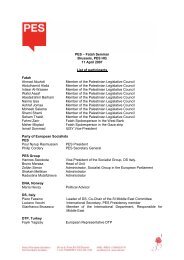Hedge funds and Private Equity - PES
Hedge funds and Private Equity - PES
Hedge funds and Private Equity - PES
You also want an ePaper? Increase the reach of your titles
YUMPU automatically turns print PDFs into web optimized ePapers that Google loves.
130<br />
4.2 The issue of pension <strong>funds</strong><br />
The privatisation of pension systems in many countries, ‘legitimised’ by increasing demographic<br />
pressures on public systems, means that workers are increasingly being called upon to<br />
save for their retirement through various forms of pre-funded schemes governed by private<br />
pension <strong>funds</strong>. In some countries these pension <strong>funds</strong> are major players on the capital markets.<br />
In the US, the UK <strong>and</strong> Canada, pension <strong>funds</strong> hold on average 20% of the stock market capitalisation.<br />
Privatisation reforms have often been accompanied by de-regulation of pension <strong>funds</strong>’ investment<br />
policies to diversify – <strong>and</strong> hence mitigate – their market risks. Once bounded by strict<br />
quantitative restrictions (for example a 20% limit to investment in equity), in most jurisdictions<br />
pension <strong>funds</strong> are now free to determine the composition of their portfolio by asset classes as<br />
long as they respect value-based “prudent person” st<strong>and</strong>ards.<br />
In the face of demographic pressures also squeezing such <strong>funds</strong>, rates of return on ‘safe’ investments,<br />
such as government bonds, that are very low <strong>and</strong>, in some cases, the severe losses that<br />
were incurred in the 2001 downturn, pension <strong>funds</strong> are increasingly looking to gain higher rates<br />
of return <strong>and</strong> to seek out ‘alpha returns’ in particular. Investment returns can be disaggregated<br />
into two parts: returns that are generated by generic market movements, known as beta, <strong>and</strong><br />
residual returns that are attributed to the specific investment added-value, known as alpha. With<br />
lower market ‘beta’ returns, investors need to extract more ‘alpha’ to meet their funding targets,<br />
<strong>and</strong> for pension <strong>funds</strong> to match their liabilities. Alpha investment strategies are short horizon strategies<br />
using various tactical asset allocation techniques (such as delta-tilt, cross-market & overlay,<br />
flexible absolute returns, low liquidity & equity-tilt, long-only & long/short hedge <strong>funds</strong>, etc.)<br />
As a result of the de-regulation of their investment policy <strong>and</strong> the search for ‘alpha’ returns,<br />
pension <strong>funds</strong> are diverting part of their assets away from traditional bonds <strong>and</strong> equity investments<br />
into new ‘alternative’, alpha-oriented investment vehicles such as hedge <strong>and</strong> private equity<br />
<strong>funds</strong> (including <strong>funds</strong> of <strong>funds</strong>).<br />
This raises two main issues:<br />
Pension <strong>funds</strong> aim to generate a long-term flow of income from their accumulated capital in<br />
order to meet their commitments – pay out pensions – also over the longer term. This<br />
suggests that investment in short-term <strong>and</strong> highly risky forms of investment should, at most,<br />
be a marginal activity for such <strong>funds</strong>, a little speculative froth on the top of a large cup of<br />
sustaining liquid. As shown elsewhere in this report, however, there are systemic pressures<br />
on fund managers pushing them to ‘go with the flow’ (herding) <strong>and</strong> not to let their returns fall<br />
significantly below the current best performers in the industry. Yet if these ‘best performers’<br />
are merely so in the short term because of a favourable run of speculative successes, there<br />
will be a general pressure to take on higher risk. Moreover as pension fund money flows into<br />
alternative investments, which are by definition niche markets, it is increasingly unlikely that,<br />
as a whole, they will continue to be able to extract ‘alpha’ returns over <strong>and</strong> above the normal<br />
market rates of return.<br />
A second concern is that of a division between the interests of retired (or elderly) workers<br />
whose pension <strong>funds</strong> are pushed to adopt alpha risk strategies, including investment in hedge<br />
<strong>funds</strong> <strong>and</strong> private equity <strong>and</strong> younger employed workers who are facing cuts in pay <strong>and</strong> conditions<br />
(threatening their own ability to save for their retirement) as a result of the self-same<br />
activity (such as the negative effects of leveraged buy-outs on wages, employment <strong>and</strong><br />
working conditions). Such tensions are likely to exacerbate the already serious problem of<br />
achieving inter-generational equity in designing <strong>and</strong> reforming public pension systems.




